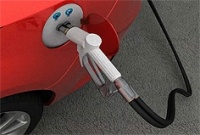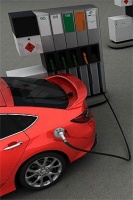It follows around five years of research into storable hydrogen fuels led by Prof Stephen Bennington at Rutherford Appleton Laboratory in Oxford and the London Centre for Nanotechnology at University College London.
One of the major stumbling blocks for hydrogen-powered vehicles is figuring out a way to carry enough hydrogen on board to travel even moderate distances between refuelling stops.

Currently, storing hydrogen requires either high-pressure cylinders at up to 700 times atmospheric pressure or super cooling to a liquid at -253oC.
Hydrides, which are powdered solids made up of hydrogen bonded to a more electropositive element or group, have been touted as one solution. In 2005 the US Department of Energy announced it would be investing $64m (£40.4m) to fund research into hydrides and other hydrogen storage technologies.
However, as Bennington pointed out, hydrides are not quite ready.
‘When you heat them up they take several hours for the hydrogen to come out — that’s obviously not ideal for fuel. Second, they’re either very sensitive to oxygen in the sense that they degrade very quickly in air, or they’re high flammable.’
Bennington and his team devised a way of attaching the hydrides to nanoscale polymer fibres through a process called electrospinning. In this form the hydrides are safer, have a longer life and the hydrogen is released almost instantaneously upon heating.
‘You extrude the polymer and the hydride in a solution and put a large electric field on it and out the bottom of that comes these nanofibres — we think that’s a scalable process,’ Bennington said.
The group then began investigating nanobeads rather than fibres, which have the added advantage that they can be poured and pumped like a liquid.

‘The idea would be that you have two nozzles. When you go to fuel your car one nozzle will be giving you the fresh polymer beads with hydride and the other one is sucking out the used stuff, which is then sent off to be recycled — that’s our vision.’
Specialist chemical company Thomas Swan and Co is providing investment for initial demonstrations of the technology.
In tandem with the automotive application, Cella Energy is also looking at portable fuel cells for military personnel. Currently, soldiers carry lithium-ion batteries to power high-tech kit such as night-vision headsets. Bennington thinks a portable hydrogen bag incorporating their polymer fibres could provide a lighter and more efficient solution.




Red Bull makes hydrogen fuel cell play with AVL
Surely EVs are the best solution for motor sports and for weight / performance dispense with the battery altogether by introducing paired conductors...